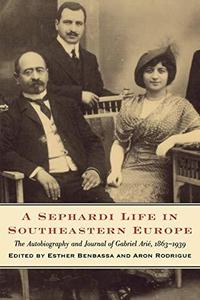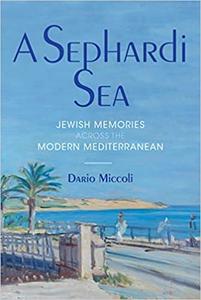- Книги
- 7-07-2023, 14:56
- 72
- 0
- voska89

Free Download A Sephardi Life in Southeastern Europe: The Autobiography and Journals of Gabriel Arie, 1863-1939 By Gabriel Arie; Aron Rodrigue; Jane Marie Todd
1998 | 333 Pages | ISBN: 0295976748 | PDF | 16 MB
Autobiographical texts are rare in the Sephardi world. Gabriel Arie's writings provide a special perspective on the political, economic, and cultural changes undergone by the Eastern Sephardi community in the decades before its dissolution, in regions where it had been constituted since the expulsion from Spain in 1492. His history is a fascinating memoir of the Sephardi and Levantine bourgeoisie of the time. For his entire life, Arie--teacher, historian, community leader, and businessman--was caught between East and West. Born in a small provincial town in Ottoman Bulgaria in 1863, he witnessed the disappearance of a social and political order that had lasted for centuries and its replacement by new ideas and new ways of life, which would irreversibly transform Jewish existence.A Sephardi Life in Southeastern Europe publishes in full the autobiography (covering the years 1863-1906) and journal (1906-39) of Gabriel Arie, along with selections from his letters to the Alliance Israelite Universelle. An introduction by Esther Benbassa and Aron Rodrigue analyzes his life and examines the general and the Jewish contexts of the Levant at the end of the nineteenth and the beginning of the twentieth centuries.
Полная новость
- Книги
- 4-04-2023, 00:21
- 97
- 0
- voska89

Free Download Dario Miccoli, "A Sephardi Sea: Jewish Memories across the Modern Mediterranean "
English | ISBN: 0253062926 | 2022 | 236 pages | PDF | 13 MB
A Sephardi Sea tells the story of Jews from the southern shore of the Mediterranean who, between the late 1940s and the mid-1960s, migrated from their country of birth for Europe, Israel, and beyond. It is a story that explores their contrasting memories of and feelings for a Sephardi Jewish world in North Africa and Egypt that is lost forever but whose echoes many still hear. Surely, some of these Jewish migrants were already familiar with their new countries of residence because of colonial ties or of Zionism, and often spoke the language. Why, then, was the act of leaving so painful and why, more than fifty years afterward, is its memory still so tangible?
Полная новость
